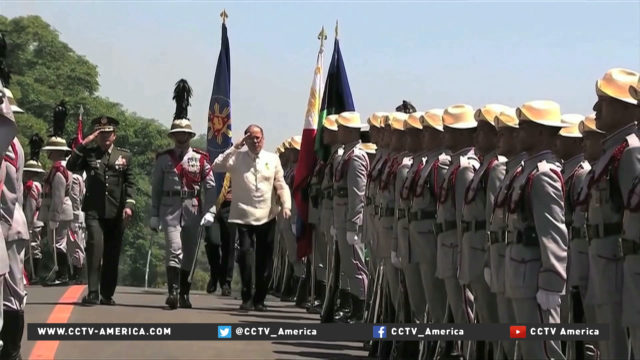The Philippines is grappling with a resurgence of Islamic militancy in the midst of a presidential election. The Islamic State-linked Abu Sayyaf group has proven to be a force to be reckoned with – going on a kidnapping spree over the past year. With the upcoming elections on Monday, the terrorist group is an increasing concern for the candidates and voters.
CCTV’s Barnaby Lo reports from Manila.

Just two weeks ago, Canadian Prime Minister Justin Trudeau condemned the beheading of one of the foreign hostages of the Abu Sayyaf, based in the Southern Philippines. Now the group has released another video of other hostages pleading for their lives.
“I’m appealing to the Canadian government, the Filipino government, friends, family, anybody who can possibly help us. If the demand is not met, we will be executed like John was a few days ago,” Kjartan Sekkingstad, a Norwegian hostage said.
Abu Sayyaf released ten Indonesian hostages this week, but several others remain in captivity. That it’s made good on its threats has alarmed not just the Philippine government but the international community as well.
“Its recent activities have proven that the Abu Sayyaf group is no longer a spent force but a very strong force to reckon with,” Security Analyst Rommel Banlaoi said.
To address the threat, the Philippines, Indonesia and Malaysia have agreed to conduct joint maritime patrols.
Philippine President Benigno Aquino has vowed to debilitate the Abu Sayyaf.
“Our primary objective is to rescue the hostages and ensure the safety of our civilian population. We will leave no stone unturned and are studying every instrument, both military and legal, to ensure success in our areas of operations and wherever else required,” Aquino said.
But Aquino is stepping down in June.
On Monday, Filipinos are heading to the polls to vote for a new president. The current frontrunner, Rodrigo Duterte, is a known strongman from the Southern Philippines.
“Based on my understanding of the attitude of the Abu Sayyaf group, they are threatened with stronger leader. But I think institutions must address this threat and not the individual personality,” Banlaoi said.
Since the Abu Sayyaf was created more than 20 years ago, every sitting Philippine president has vowed to crush the militant group. It has however proven to be resilient, something the next president will have to continue to contend with.
 CGTN America
CGTN America
